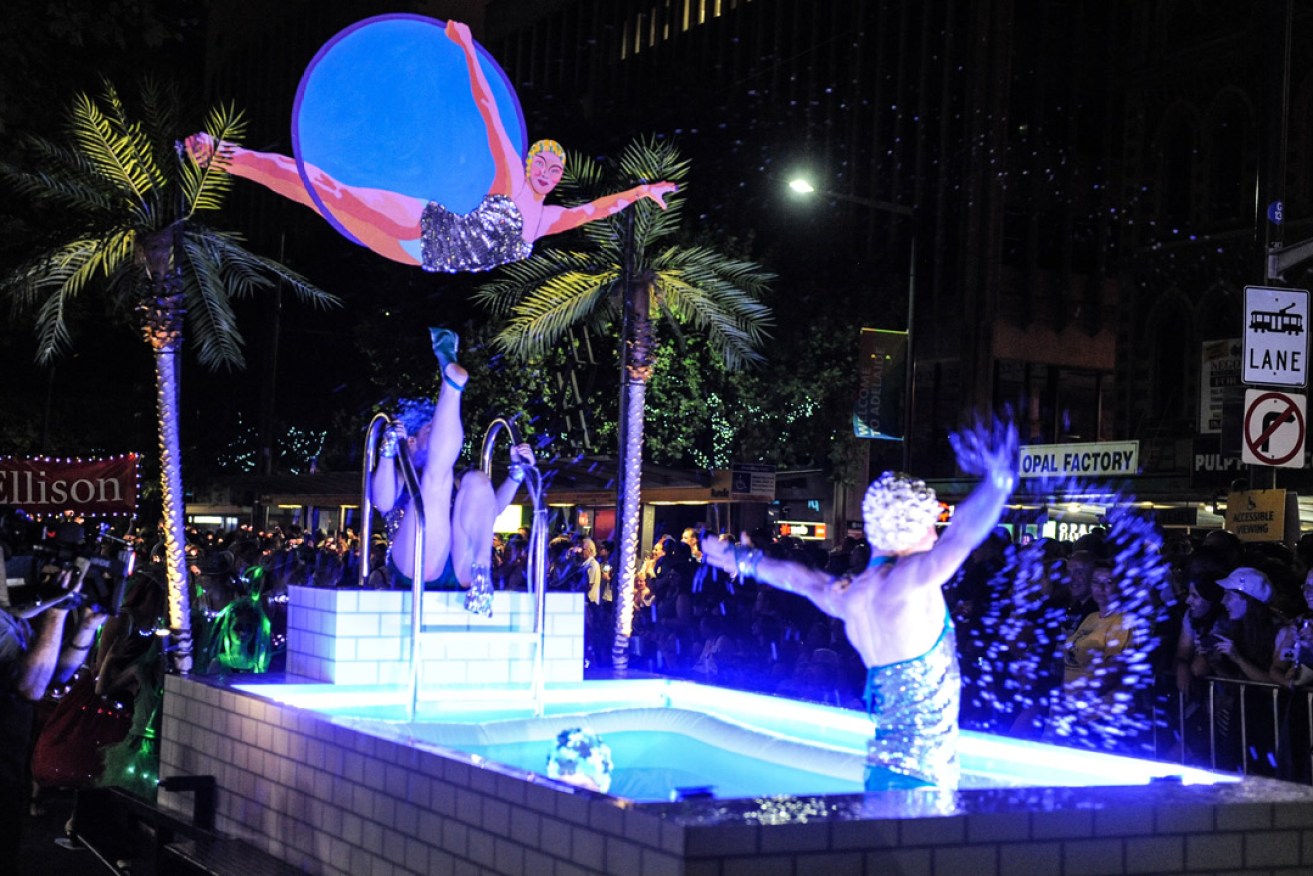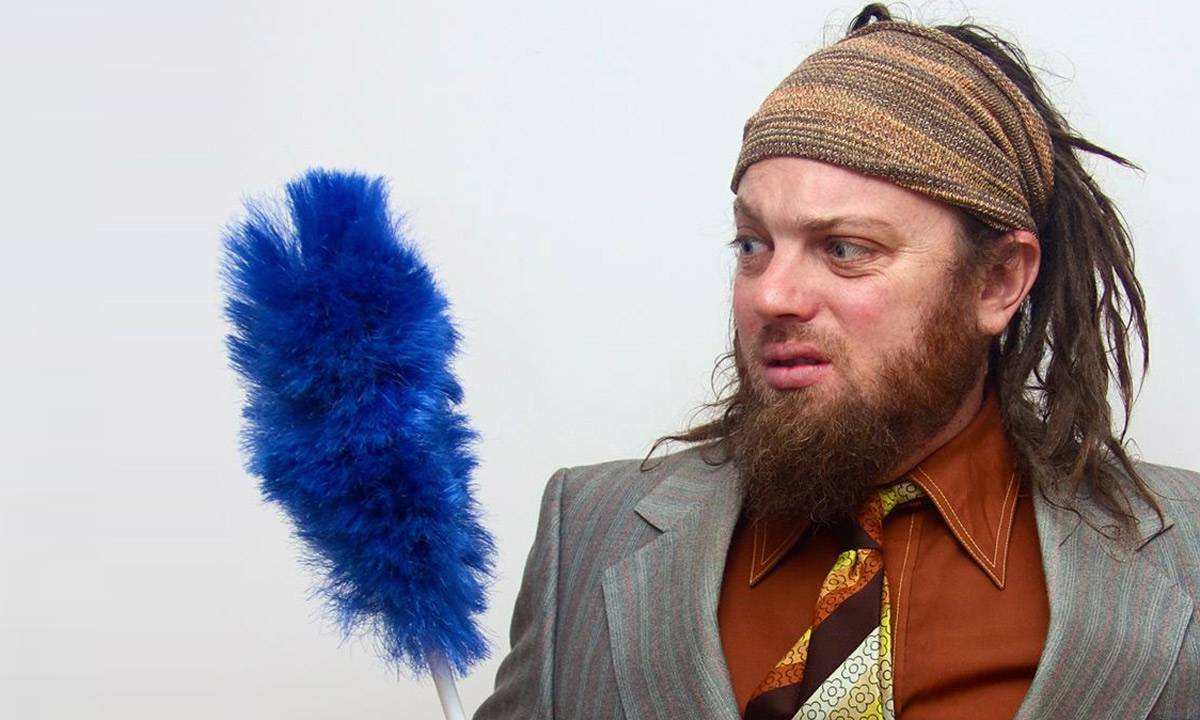Adelaide Fringe: If you can make it here …
British comedian Alexis Dubus’s slamming of Adelaide’s “terrible” Fringe has stirred a hornet’s nest among artists. So can smaller acts still make a buck during Mad March?

The Adelaide Fringe opening parade.
Dozens of artists have supported Dubus – better known as his performance alter-ego Marcel Lucont – through social media, bemoaning poor ticket sales and the difficulty of competing for audiences with much larger “corporate” shows backed by slick PR machines.
Many complain about the growth of big entertainment hubs such as the Garden of Unearthly Delights and the Royal Croquet Club, and what they see as the loss of the Fringe’s original ethos of showcasing innovative, grassroots acts and supporting emerging artists.
It’s an issue that has clearly been simmering for some years as the Fringe has grown exponentially, and with a record number of more than 1100 events in 2016 across several hundred venues, competition this year is tougher than ever.
Yet as Fringe organisers point out, some smaller shows – such as theatre shows A Gambler’s Guide to Dying (Holden Street Theatres) and Bicycle (Adina Tunnels), and local cabaret artist Michael Griffith’s Cole – have managed strong ticket sales.
Another example is American comedian Michael Burgos’s comedy The Eulogy, which has sold out most of its performances at Tuxedo Cat, the same venue where Dubus has been presenting his Versus the World show.
“It [Adelaide] has been comparable to others cities in the sense that most of the shows have sold out,” says Burgos, who has also presented The Eulogy at the Perth Fringe and in venues across America.
The experience of Burgos – who won a Fringe weekly award for Best Comedy and says he would return to Adelaide – bears out the argument that good promotion is a key ingredient of Fringe success.
The Eulogy tells of a man who, after a lifetime of gluttony, died from eating too many eggs. After finding that it was especially popular with people working in fields related to death, Burgos engaged in some clever marketing, including targeting Blackwell Funerals.
“I think planting little seeds like that helps … I came over two weeks before I started performing to physically be on the streets offering flyers and having conversations with people; that just helps sell out the first couple of shows.
“Even though I’m new to this, I’ve already started to see and understand that if your first two or three shows sell out, it can propel a lot of momentum.”
Another Fringe comedy weekly award winner, Adelaide’s Fabien Clark, has also had several sell-out shows in the small theatre he is performing at in The Producers bar. Most nights, he says, it has been at least three-quarters full.
He, too, has put great effort into marketing, as well as doing short performances in shows featuring other comedians to raise his profile.
“Keeping the goal small is a better way to do it, rather than getting a massive venue and wondering why you can’t fill it,” he says.
“But you can’t expect people to just come. You’ve got to market and do all those things … people aren’t just going to show up.”
But Clark, who has also performed at the Perth Fringe and Melbourne Comedy Festival, agrees it is becoming more difficult to attract audiences during Adelaide Fringe. He says he noticed similar problems were emerging at this year’s Perth event, which has also grown significantly.
“The festival [Adelaide Fringe] is humungous and it is hard to break through.
“A lot of people say they went to the Fringe, but they just had a drink in the Garden.
“This is about my sixth Adelaide Fringe … I think it is getting more difficult to get audiences.”
Phil Kalogeras, Adelaide producer and performer of interactive murder-mystery theatre show A Murder Most Foul, blames a “confluence of events” for the difficulties facing many Fringe artists.
His own show is enjoying a good run, selling out performances at Ai Fiori Wines – a fact he attributes partly to the fact that it sits in a genre with less competition.
Nonetheless, he has empathy with artists who struggle to fill venues, and has strong views about the format of the Fringe.
“People have been making losses at Adelaide Fringe for years. Very few people make money at Edinburgh Fringe, either.”
Kalogeras, who has a day job as a computer systems engineer/business consultant, believes the council should address what he describes as the “vertical integration” of events on publicly owned land such as the Parklands, where one business controls all the entertainment, food and beverage options.
He say making the Fringe an annual event also added greatly to the competition among acts, with large shows that may previously have toured at other times of the year now being “tacked onto” the festival program. He takes aim particularly at the large tents – what he describes as the “big Taj Mahals” – which seat several hundred audience members in hubs such as the Garden.
“That’s one of the issues the Fringe will have to deal with – how do you grapple with big shows like that that would have toured before the Fringe went annual.”
One regular Fringe performer and Adelaide expat told InDaily the concerns expressed by Dubus and others reflected “a widely held view [across] every Fringe”.
“Adelaide has never been a money earner. For Aussie comics it makes sense but for any international unknown, it’s very difficult,” he said.
He chose another prospective gig overseas this year, eschewing his regular homecoming.
“It’s just too big and has stopped being a model for how Fringes should be run.
“Arts have always been this way, I think… we all want to be financially acknowledged for our hard work, but it’s a hard thing to convince ‘the people’ to choose a lesser-known show over the big ones and so therefore ‘fringe’ is not really what these festivals are any more.”
Fringe director and CEO Heather Croall told InDaily yesterday that the organisation was “absolutely committed to the ‘Fringest of the Fringe’”, and was committed to helping artists “cut through” in their venues.






